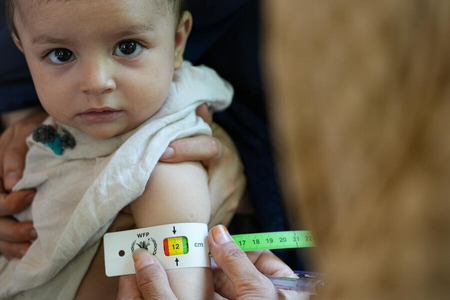Kabul: The United Nations World Food Programme (WFP) has warned that in 2025 a whopping 3.5 million children in Afghanistan are at risk of malnutrition. The agency expressed concern over the huge number of children expected to be affected. Additionally, 1.2 million pregnant and breastfeeding mothers are suffering from malnutrition and urgently need treatment and nutrition support.
“Once a child or a woman becomes malnourished, we have to help them, or they risk worsening to severe malnutrition, which is a life-threatening situation. The mortality risk is very high for moderately malnourished children – three times higher than for children who are not malnourished,” says Mona Shaikh, Head of Nutrition for the WFP in Afghanistan.
The UN agency in its report said that nearly one-third of Afghanistan’s population – up to 15 million people – need emergency food assistance to survive. Eight out of ten families cannot afford a minimally nutritious diet, and three out of four families have to borrow money to buy basic groceries.
WFP says it urgently needs $555 million to maintain vital food assistance across all its programmes for six months. Without additional funding, critical programs for women, children and families – including emergency food assistance, malnutrition treatment, school feeding and vocational training for women – are at risk in Afghanistan.
Currently, WFP can only provide emergency food assistance to just over 6 million people per month out of the nearly 15 million people in need across the country.
WFP stated that in 2024, it reached almost 10 million women and children across Afghanistan, across all its activities, including treatment of malnutrition of 1 million mothers and 1.4 million children, out of which 829,000 were girls. But more needs to be done as two-thirds of female-headed families in the country cannot afford essential nutrition, 20 per cent more than male-headed households.
“People are in a very difficult situation. We are seeing more and more women and children coming to the clinics. Many of these mothers are very young,” says Shaikh.
According to a WFP report, malnutrition does irreparable damage to a child’s physical and cognitive development, weakening immune systems, stunting growth and limiting brain development. Malnutrition often begins during pregnancy, which is why prevention programmes that target at-risk mothers and children are essential. Acting early and fast is the only way to avoid the lifelong impact of wasting on a child’s health.
“We must prevent child malnutrition before it ever takes hold. If we fail to act, we are condemning millions of children to a lifetime of suffering. WFP has the knowledge and tools to stop malnutrition in its tracks—what we need is investment and political will,” said WFP Executive Director Cindy McCain.
–IANS


Comments are closed.